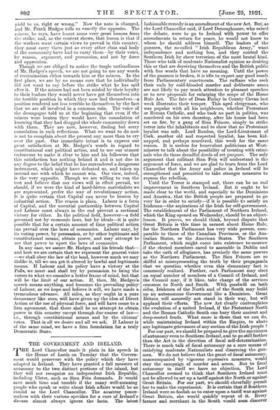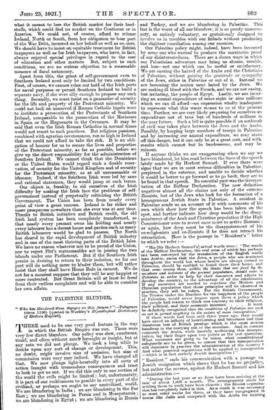THE GOVERNMENT AND IRELAND.
r11.E Lord Chancellor made it plain in his speech in the House of Lords on Tuesday that the Govern- ment ,would persevere with the policy which they have adopted in Ireland. They have granted, a -full measure of autonomy to the two distinct portions of the island, hut they will not recognize an independent Irish Republic, including Ulster, such as Sinn _Fein. demands. It would save much time and trouble if the many well-meaning people .who speak or write about Irish affairs: would be-as candid as the Lord. Chancellor. The amateur peaee- makers with their various. specifics for a cure . cif Ireland's disease almost ,always ignore the facts. The latest. fashionable remedy is an amendment of the new Act. But, as the Lord Chancellor said, if Lord Donoughmore,-who raised - the debate, were to go to Ireland with power to :offer amendments in return -for peace, he would not know to whom he should address himself. The leaders of the gunmen, the so-called " Irish Republican Army," want independence and nothing less, and they control the Southern Irish by sheer terrorism.of the most brutal kind. Those who talk of. moderate Nationalist opinion as desiring this or that are deceiving themselves• and the British public with fine -words that have no meaning. Until the power of the. gunmen is broken, it is- idle to expect any good result from Parliamentary enactments. The ruffians who seek their ends by cold-blooded murder and deliberate arson are not likely to pay much attention to; pleasant speeches or to new proposals for enlarging the scope of the Home Rule Act. The-fate of Dean Finlay in County (Cavan last week illustrates their temper. This aged clergyman, who was popular with all his neighbours, whether Protestant or Roman Catholic, and who took no part in politics, was murdered on his own doorstep, after his -house had been set on fire, by a gang of :Sinn Feiners, simply to -strike terror- into the inhabitants and to show that no Protestant loyalist was safe. Lord Bandon, the Lord-Lieutenant of Cork, another old and respected loyalist, has been kid- napped, and perhaps murdered, this week for the same reason. It is useless for benevolent politicians at West- minster to talk about the possibility of. treating with crimi- nals who do these dreadful deeds of set purpose. • The only ;argument that militant Sinn -Fein will understand. is the ;argument of force, and we are glad to learn from the Lord Chancellor that the Army and police in Ireland will be -strengthened and permitted to take stronger measures to .repress -the rebellion. Until the Terror is stamped out, there can be no real 'improvement in Southern Ireland. But it ought to be made clear to the world, and especially to the Dominions and America, that the British people are prepared to go very far in order to satisfy—if it is possible to satisfy an Irishman—the aspirations of the Irish for self-government. The establishment of the Parliament- of Northern Ireland, which the -King opened-on Wednesclay,.should be an object-- lesson. It proves, we should think, beyond dispute that +Great Britain is this time in earnest about Home Rule, for the Northern Parliament has 'very wide powers, com- parable ;to those of the- Canadian Provinces, or the Aus- tralian States, or the American States. The Southern Parliament, which might . come into existence to-morrow if- the elected members - eared to assemble in Dublin and take; the oath- of allegiance, has precisely the same powers as the Northern Parliament. The Simi Feiners are so skilful at misrepresenting the truth by their propaganda that we question whether even this -elementary fact is commonly realized. Further, each Parliament may elect an equal number of members of a Council of Ireland, and the -Council may, if it likes, take charge of the services comm on to North and South. With goodwill on both sides, Irishmen of the North and of the -South may build up an autonomous -Government like a Dominion. Great Britain will assuredly not stand. in their way, but will applaud their efforts. The new Act clearly contemplates the evolution. of a united Ireland, if the .Protestant 'North and the -Roman Catholic South can bury their ancient and deep-rooted feuds. What more is -there that we can do, while maintaining Ireland within the Empire, to abate any legitimate grievances of any seetionof the Irish people ? For. our part,.wesh,ould be prepared to give.-the maximum , of.autonomy event° Southern Ireland,and, to go:still:further than-the Act in-the direction of fiscal self-determination. There is much talk of fiscal. autonomy as a sure means of satisfying moderate. Nationalists and disarming the gun- men. We do not believe that the gmnt of fiscal autonomy, unaccompanied by vigorous repressive measures, would stay the campaign of murder and arson. But to fiscal autonomy in itself we have no objection. The Lord Chancellor seemed to -think that - Southern Ireland must not be allowed:to sat up a tarigagainst. the North: oragainst Great -Britain. For our part, we should -cheerfully permit her to makethes experiment. It:is certain that if Southern Ireland were so -foolish as to. enter -upon-a tariff wan against Great. Britain, she would quickly repent of it. .Every 'farmer and .merchant in the South would soon ,descover what' it meant to lose the British market for their food- stuffs, which could find no market on the Continent or in Aineriea. We could not, of course, afford to release Ireland, North or South„ from her obligation teebear part of the W.ar. Debt, incurred on her behalf.' s well as ,on ours. We shouldshaveto, insist orrequitable treatment for British taxpayers, as well as for 'Irish taxpayers, who have, in fact, always enjoyed special privileges in regard to the cost of education and other matters But, subject to such conditions, we see no serious objection to a, reasonable measure of fiscal autonomy. Apart from this, the groat of self-government even to Southern Ireland, need only be limited by two conditions. First, of course, we cannot relax-out hold, of the Irish ports for naval purposes or permit Southern Ireland to build a separate navy, if she were silly enough to propose any such thing. Secondly, we must insist on a. guarantee of security for the life and property of the Protestant minority. We could not look on unmoved if Roman Catholic bigots- were to institute a persecution of the Protestants of Southern Ireland, comparable to the persecution of the Moriscoes in .Spain or the Huguenots in the Cevennes. It may be said that even the Irish Roman Catholics in„normal times would not resort to such practices. But religious passions, combined with agrarian covetousness, run so high in Ireland that we could not afford to take the risk. It is- an- obli- gation of honour for. ua to secure the lives and- properties of the Protestant minority, as far as possible, before• we give up the ,direct responsibility for= the administration of Southern Ireland. We cannot' think that the Dominions or the United States would regard such a double reser- vation, ofseenrity. fertile United Kingdom and of security for: the Protestant minority,. as at all unreasonable 'or' irksome. Indeed; it the Southern' Irish were led' by sane and rational statesmen., they would jump at such terms. Our object, is, frankly, to rid ourselves of the Irish difficulty by making the Irish' face the problems of self- government' instead of perpetually criticizing the British, Government. The Union has been from nearly every point of view a great. success. Ireland is far richer and mere prosperous-nowadays than she ever was at any time. Thanks to British initiative and British credit, the old Irish land system has been completely transformed, so that nearly every peasant owns his. holding and nearly' every labourer =haste: decent' house and garden suck. as -many British labourers' would' be glad' to possess. The North, has shared in the rapid development- of British industry andsis cote of .the rnost thriving parts of the British Isles.
We have no reason whatever not to be proud of the Union, nor' to' regret Pitts' statesmanlike act in joining the two islands under one' Parliament; But if the Southern Itish persist in desiring to return to their isolation, we fOr our part' will do nothing more to hinder them, but-will rather insist that they shall have Home Rule in earnest. We do not for a :moment suppose that they, will be airy happier or more contented. But Great Britain will at leaathe freed from-their endless complaiets and -will be able-to consider her own affairs.



































 Previous page
Previous page